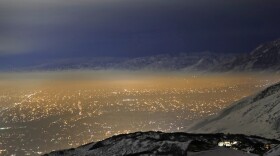
Rebecca Hersher
Rebecca Hersher is a reporter on NPR's Science Desk, where she reports on outbreaks, natural disasters, and environmental and health research. Since coming to NPR in 2011, she has covered the Ebola outbreak in West Africa, embedded with the Afghan army after the American combat mission ended, and reported on floods and hurricanes in the U.S. She's also reported on research about puppies. Before her work on the Science Desk, she was a producer for NPR's Weekend All Things Considered in Los Angeles.
Hersher was part of the NPR team that won a Peabody award for coverage of the Ebola epidemic in West Africa, and produced a story from Liberia that won an Edward R. Murrow award for use of sound. She was a finalist for the 2017 Daniel Schorr prize; a 2017 Pulitzer Center on Crisis Reporting fellow, reporting on sanitation in Haiti; and a 2015 NPR Above the Fray fellow, investigating the causes of the suicide epidemic in Greenland.
Prior to working at NPR, Hersher reported on biomedical research and pharmaceutical news for Nature Medicine.
-
A new catalog of Southern California earthquakes is 10 times larger than its predecessor list. The details of frequent, small quakes help scientists study what triggers large, destructive ones.
-
Maria was the rainiest storm known to have hit Puerto Rico. Scientists say a storm of such severity is nearly five times more likely to occur today, with warmer air and ocean water, than in the '50s.
-
After back-to-back hurricanes and wildfires, insurers are looking for more-resilient construction materials. That means building model homes and then blowing off their roofs or setting them on fire.
-
Some panel members said they don't agree that breathing sooty air can cause premature death. The panel's draft recommendations to the EPA would change how it assesses the dangers of air pollution.
-
The storm is bringing high winds, snow, rain and dangerous road conditions. Meteorologists and local officials are warning people across the West and Midwest to cancel travel plans.
-
The federal government spends billions of dollars each year helping communities rebuild after disasters and to prevent future damage. But that money isn't always allocated to those who need it most.
-
The number of people taken into custody at the southern U.S. border with Mexico has been decreasing since 2000. Economists say the reasons people choose to cross the border illegally are changing.
-
Sea stars along the Pacific Coast are dying in the largest disease epidemic ever documented in a wild marine species. New research suggests warmer water is making the disease even more deadly.
-
Despite the shutdown, the National Weather Service is putting out forecasts and helping local officials prepare for dangerous weather, even as employees worry about making ends meet at home.
-
The TSA has repeatedly reminded air travelers to put sharp Batman and other superhero paraphernalia in checked baggage.









